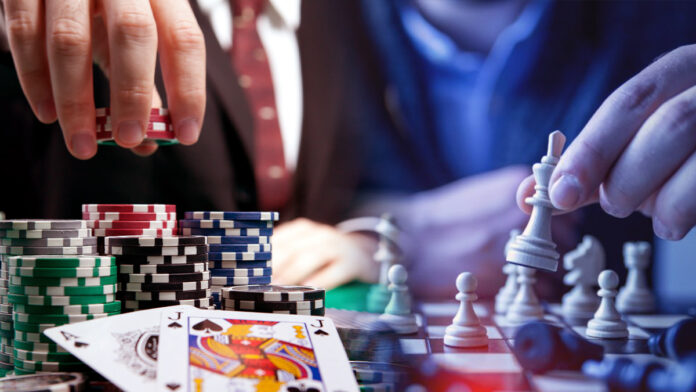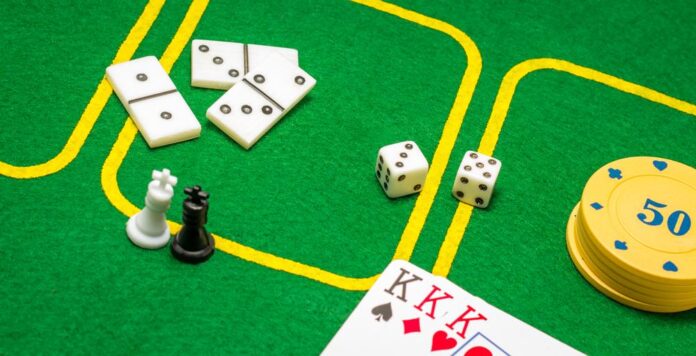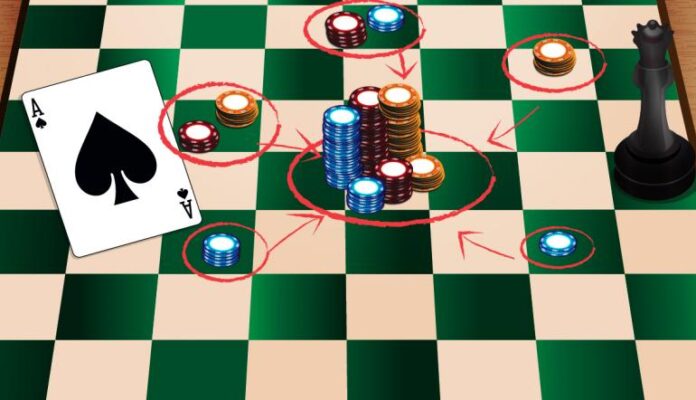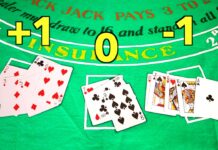Have you ever felt like you are playing a game of chance when playing a game of chess? You’ve probably had one too many games wherein the tide has suddenly turned in the most unexpected way and left you feeling dumbfounded. Well, it turns out that chess and gambling have more in common than you think!
Similarities between Chess and Gambling

Chess is a board game that is experienced and enjoyed by millions of people worldwide. It is a two-player strategy game requiring intelligence, creativity, and an understanding of how to best navigate the possible moves in order to triumph against your opponent. It may come as a surprise to some, but chess is actually quite similar to gambling. While on the surface these two activities seem worlds apart, they are much more connected than you may expect. There are a few ways that chess and gambling have similar characteristics:
1. Risk vs Reward

In both chess and gambling, players must weigh the potential risks versus rewards when it comes to making a move or playing their hand. Depending on the circumstance, they may have to decide between going all-in or holding back and playing it safe. Just as with poker or blackjack, it requires both intuition and strategy in order to gamble wisely in chess too.
2. Calculated Moves
Professional gamblers know that their best chance of winning big lies in making calculated moves every step of the way. The same goes for serious chess players who want to anticipate their opponent’s moves in order to make the best strategies for victory. Both require analyzing probabilities before taking action so that long-term success can be achieved over time.
3. Chance Factor
Neither chess nor gambling has 100% predictable outcomes which let chance play into each activity’s success or failure rate over time; whether it’s from rolling the dice or unexpectedly having a pawn taken during play – luck plays its part here as well as skill for players on both fronts!
4. Outsmarting your Opponent
Players need quick reflexes as well as expertise in order to outsmart their opponents on either side of these activities; whether it be another cagy poker player at the table or someone else sitting across from you at a game of chess! It’s not just luck but also being able to track what other people might do by paying attention & staying one step ahead which will inevitably give any player an edge over anyone whom they face up against at either pursuit!
Strategies for Chess and Gambling

Every strategy should begin with an assessment of the risks and rewards associated with the given decision being made. With chess, this involves evaluating which moves will lead to a favorable outcome given the status of the board – how much material you’ve lost or gained, who has control of the pieces, and what pieces are still unaccounted for. Likewise, when it comes to gambling, assessing all available options and deciding on those that best represent your risk-reward ratio is paramount to playing optimally.
The next element to consider between chess and gambling is positional awareness. This refers to understanding where your pieces are on the board at any given time in comparison to your opponent’s pieces, as well as considering who has control of certain squares or corridors. Just like a gambler needs to understand what game they’re playing in order to make the most out of their decisions (poker vs blackjack vs slots etc.), a chess player needs to understand who is better positioned versus their opponent in both actual commands (pieces on the board) and hypothetical commands (future possible positions). Positioning yourself for success means that you must have an acute awareness of all potential pathways available within a particular position before making any decision.
Finally, both players must use psychological tactics to gain an edge over their competitors in order to take advantage of weaknesses or mistakes in judgment; bluffing or bluff calls can rattle opponents and distinguish great players from average ones even within individual moves! At its core, this overarching concept applies perfectly from one arena to another: Chess teaches us how successful strategic decisions often give way to incredible opportunities if we know when we’re being bluffed rather than staying true blindly for lack of other options. And to wrap up – both activities can be played at online casinos without the need of leaving your home.
Popular Chess and Gambling Events

For ages, chess and gambling have been closely linked by their players, strategists, and fans. According to experts, many of the same principles of strategy and risk-taking that apply to gambling also apply to the game of chess.
There is no denying that both events have a certain amount of luck involved in them, but both still nevertheless require complex and sophisticated strategies for success. To understand why chess is so similar to gambling, let’s look at some popular events associated with both activities:
- Chess tournaments often resemble gambling competitions in that they involve multiple opponents making moves on a board with unknown pieces. The opponents will make decisions based on probabilities and then act on what they believe to be the best move based on this knowledge.
- World Series of Poker is one of the most well-known gambling events today. It involves various forms of poker being played over several days with thousands or even millions of dollars at stake. These tournaments are ultimately won by skilled players who understand how to read their opponents, manage risk correctly and take advantage of certain patterns in all sorts of betting situations. All these skills are required in playing chess too because winning out against all opponents involves making sound decisions while adapting quickly whenever necessary.
- Bookmaker bets refer to wagers placed between two parties on an event with an unknown outcome such as a sporting match or game show episode. Whereas bets are usually decided quickly in many types of gambling, chess games can last hours or days if players want them to; however, they often feature the same principles such as calculating odds ahead before proceeding with any moves discussed previously
Conclusion
To sum up, although it might be difficult to believe that Chess is similar to gambling, the fact remains that some of the key elements of each activity have a lot in common. From the strategy and skills used to the potential rewards involved, there are clear similarities between these two activities. An important distinction to make however is that much of a gambler’s success lies in their ability to take risks whereas with chess a more cautious approach can often be seen as the wiser move. Thus, it can be said that while there may be similarities between Chess and Gambling, the activities are certainly not one and the same.









